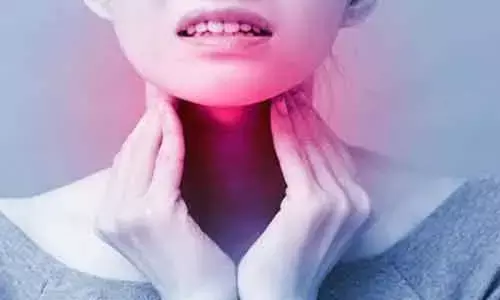- Home
- Medical news & Guidelines
- Anesthesiology
- Cardiology and CTVS
- Critical Care
- Dentistry
- Dermatology
- Diabetes and Endocrinology
- ENT
- Gastroenterology
- Medicine
- Nephrology
- Neurology
- Obstretics-Gynaecology
- Oncology
- Ophthalmology
- Orthopaedics
- Pediatrics-Neonatology
- Psychiatry
- Pulmonology
- Radiology
- Surgery
- Urology
- Laboratory Medicine
- Diet
- Nursing
- Paramedical
- Physiotherapy
- Health news
- Fact Check
- Bone Health Fact Check
- Brain Health Fact Check
- Cancer Related Fact Check
- Child Care Fact Check
- Dental and oral health fact check
- Diabetes and metabolic health fact check
- Diet and Nutrition Fact Check
- Eye and ENT Care Fact Check
- Fitness fact check
- Gut health fact check
- Heart health fact check
- Kidney health fact check
- Medical education fact check
- Men's health fact check
- Respiratory fact check
- Skin and hair care fact check
- Vaccine and Immunization fact check
- Women's health fact check
- AYUSH
- State News
- Andaman and Nicobar Islands
- Andhra Pradesh
- Arunachal Pradesh
- Assam
- Bihar
- Chandigarh
- Chattisgarh
- Dadra and Nagar Haveli
- Daman and Diu
- Delhi
- Goa
- Gujarat
- Haryana
- Himachal Pradesh
- Jammu & Kashmir
- Jharkhand
- Karnataka
- Kerala
- Ladakh
- Lakshadweep
- Madhya Pradesh
- Maharashtra
- Manipur
- Meghalaya
- Mizoram
- Nagaland
- Odisha
- Puducherry
- Punjab
- Rajasthan
- Sikkim
- Tamil Nadu
- Telangana
- Tripura
- Uttar Pradesh
- Uttrakhand
- West Bengal
- Medical Education
- Industry
Thyroid hormone replacement therapy may increase death risk among elderly

Thyroid hormone replacement therapy in older adults is associated with a higher risk of death compared with no treatment, a large study finds. The study results were accepted for presentation at ENDO 2020, the Endocrine Society's annual meeting, and publication in a special supplemental section of the Journal of the Endocrine Society.
When people have too little thyroid hormone, called hypothyroidism, they usually require lifelong treatment with levothyroxine to supplement the body's thyroid hormone, thyroxine (T4). Some people have subclinical hypothyroidism, which occurs when the thyroid gland needs more stimulation to produce adequate thyroid hormone levels. These individuals will have modest elevations in thyroid-stimulating hormone (TSH), which stimulates thyroid hormone production.
Subclinical hypothyroidism is a mild or early form of thyroid disease, and these patients also routinely receive thyroid hormone replacement, said the study's principal investigator, Jennifer Mammen, M.D., Ph.D., an assistant professor at Johns Hopkins University in Baltimore, Md. However, Mammen notes that this interpretation of high TSH with normal T4 levels may not be correct in all older adults.
"Many older adults have an elevation in TSH with normal thyroid levels. Our earlier research showed that this can reflect developing hypothyroidism in some, while in others, it is a form of adaptation to age-related changes in health instead of thyroid disease," Mammen said. "As a result, some of these older people may be receiving inappropriate or excessive thyroid hormone therapy, a treatment that may counteract important adaptations needed for healthy aging."
The researchers studied the effects of levothyroxine therapy on survival in adults ages 65 and older. They used data from 1,054 participants of the Baltimore Longitudinal Study of Aging, a long-running observational study from the National Institute on Aging. All participants had at least one TSH and T4 measurement since 2003. Mammen's research team looked at the risk of dying during one-year intervals from 2003 to 2018 and adjusted their statistical analyses for multiple demographic and health factors that may influence survival.
They found that among older adults, use of thyroid hormone increased risk of death 60% year over year (hazard ratio 1.6). They also limited the analysis to compare individuals with normal TSH levels, reflecting normal thyroid function, to those on thyroid hormone with normal TSH levels, who were therefore treated to target, and found those on treatment had almost double the risk of dying compared with untreated persons (hazard risk 1.9), Mammen reported.
Despite studies showing that hormone treatment of an isolated high TSH may not benefit older people, Mammen said, "we were surprised that we were able to demonstrate harm associated with thyroid hormone supplementation. Our work supports the growing calls to use age-specific TSH reference intervals to determine the threshold for thyroid hormone treatment."
Mammen also recommended repeating testing after finding an isolated elevation of TSH in older adults, because levels can fluctuate. "We advocate being cautious and conservative when considering thyroid hormone treatment," she said.
This research was supported by the National Institute on Aging Intramural Research Program and grant R56AG064256. This content is solely the responsibility of the authors and does not necessarily represent the official views of the National Institutes of Health National Institute on Aging.
The Endocrine Society canceled its annual meeting, ENDO 2020, amid concerns about COVID-19. Visit our online newsroom for more information on accepted abstracts, which will be published in a special supplemental section of the Journal of the Endocrine Society.
Dr Kamal Kant Kohli-MBBS, DTCD- a chest specialist with more than 30 years of practice and a flair for writing clinical articles, Dr Kamal Kant Kohli joined Medical Dialogues as a Chief Editor of Medical News. Besides writing articles, as an editor, he proofreads and verifies all the medical content published on Medical Dialogues including those coming from journals, studies,medical conferences,guidelines etc. Email: drkohli@medicaldialogues.in. Contact no. 011-43720751


